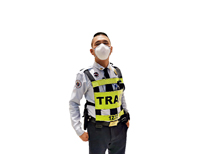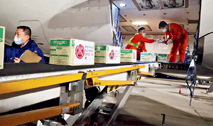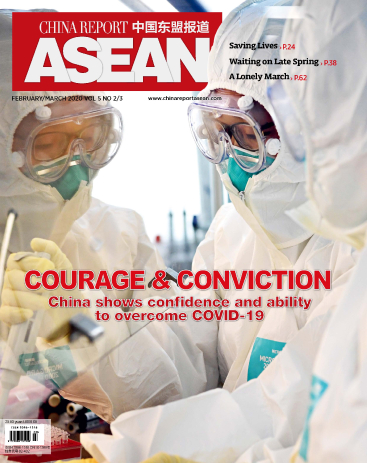The outbreak of illness caused by a novel coronavirus (COVID-19) has resulted in social panic and even some hard feelings against the Chinese people in some countries. Singaporean Prime Minister Lee Hsien Loong believes such reactions are stupid and illogical.
“This epidemic is a problem to be addressed by all nations together,” declared Prime Minister Lee in a speech on February 1. “We have confidence that China will contain this epidemic together with other countries.” He considers the outbreak a public health emergency rather than an issue between nations.
At a press conference the same day, Secretary of the Philippine Presidential Communications Operations Office (PCOO) Martin Andanar stated that the outbreak would impact every individual. He called on the general public to remain vigilant against discrimination against any racial or ethnic groups. “Preventing further spread of this virus is not something we can do on our own,” he opined. “Solidarity, compassion and cooperation are essential to solve this public health problem.”
By the evening of February 1, ASEAN countries had reported a total of 54 confirmed cases: 19 in Thailand, 18 in Singapore, eight in Malaysia, six in Vietnam, one in Cambodia and two in the Philippines. A total of 46 of the patients in ASEAN were Chinese, and the other eight were local.
Containment Efforts
The Chinese people are fighting a battle against an invisible foe. As Prime Minister Lee pointed out, the battle is not between nations or races, but against a virus outbreak that has been declared a Public Health Emergency of International Concern (PHEIC).
The Chinese government has been sharing timely information about the epidemic, the viral genetic sequence, and other pertinent information with the general public and the international community including the World Health Organization (WHO), ASEAN countries and international organizations. China has been actively seeking stronger cooperation with the world in an open, transparent and responsible manner. Chinese Ambassador to ASEAN Deng Xijun explained that the WHO's designation of the epidemic as a PHEIC is not “a no confidence vote” against China. On the contrary, the WHO has demonstrated full confidence in China's capabilities and efforts in prevention and control of the epidemic. The main purpose of the declaration was to alert the countries with fragile public health systems.
Facing new cases on their own soil, ASEAN countries have embarked on respective battles to contain the epidemic. Meanwhile, they have provided China with positive support.
Deputy Secretary-General of ASEAN Kung Phoak noted that many ASEAN leaders have expressed support and admiration for China's political determination and ability to cope with the epidemic. The international community has applauded efforts by the Chinese government such as unprecedented quarantine of major cities such as Wuhan, the capital of Hebei Province. The Chinese government has been completely transparent so the outside world can receive the latest information and take necessary measures against the epidemic. The Chinese government will be able to contain the epidemic with help from ASEAN countries.
Prime Minister Nguyen Xuan Phuc of Vietnam, the rotating chair of ASEAN in 2020, suggested that ASEAN member states reach extensive consensus on prevention and control of the epidemic. He instructed the Vietnamese Ministry of Foreign Affairs to inform the international community of measures that Vietnam has taken in epidemic prevention and control to ensure ASEAN operates normally this year. He directed the ministry to work on emergency assistance plans for China and plans to evacuate Vietnamese citizens in affected areas. He also instructed the ministry to update the situation and follow measures taken by China and other countries to ensure Vietnam acts in a timely fashion.
Ambassador Deng Xijun expressed China's appreciation for the understanding and support of ASEAN member states and their peoples as part of the fine tradition of meeting challenges and facing difficulties together.
More Terrifying Virus
The internet and social media have been flooded with all kinds of information since the outbreak of the epidemic. On January 30, Cambodian Prime Minister Hun Sen called on Cambodian netizens to stay calm and refrain from spreading misinformation and rumors. Instead, he asked people to follow official information released by government departments. With regard to the soaring price of face masks in Phnom Penh, Cambodian Government Chief Spokesman Phay Siphan pointed out that according to Cambodia's Code of Civil Procedure, price gougers could face a maximum of five years in prison. He urged shop owners to sell masks at retail prices so that everyone could afford to protect themselves.
“Rumors can easily amplify anxiety, making it more difficult for people to get the right information,” stressed Prime Minister Lee. Misleading rumors and misinformation about the outbreak can spread rapidly in the age of internet, causing fear and panic. Therefore, it is wise not to spread information blindly.
Facing rumors and misinformation, the Malaysian government has limited number of the people authorized to speak on the matter. The Minister of Communications and Multimedia Gobind Singh Deo announced that after January 27, only four senior officials would have the authority to release information on the virus: Prime Minister Mahathir Bin Mohamad, Deputy Prime Minister Wan Azizah Wan Ismail, Minister of Health Haji Dzulkefly Bin Ahmad, and Health Director-General Noor Hisham Abdullah. The purpose of the measure is to avoid confusion in the general public.
Minister Gobind Singh Deo asked the public to avoid exaggerating and creating panic. He reminded people to exercise caution when sharing information on social media to avoid contributing to misinformation. He illustrated that since the outbreak, Malaysia had faced two major problems: the virus and misinformation, which is often more terrifying. Misinformation about the virus on the internet has caused considerable confusion.
On the evening of January 27, Thai Prime Minister Prayuth Chan-o-cha delivered a televised speech and declared: “We can treat the patients and contain the epidemic. There is no reason for panic.” On January 31, Thai King Maha Vajiralongkorn and Prime Minister Prayuth sent letters to Chinese leaders to express sympathy for those affected by the epidemic. King Maha Vajiralongkorn highlighted how impressed the international community has been by the efforts, determination and measures taken by the Chinese government in response to the epidemic. Prime Minister Prayuth predicted that the Chinese people will overcome the epidemic and become stronger. Thailand highly appreciates the care China has provided for Thai citizens in Wuhan and other affected areas and stands ready to provide robust support for China's fight.

A masked guard at Greenbelt Mall in Makati, Manila after the Philippine Ministry of Health confirmed the first case of COVID-19 infection in the country on January 30.

By the evening of February 1, ASEAN countries had reported a total of 54 confirmed cases: 19 in Thailand, 18 in Singapore, eight in Malaysia, six in Vietnam, onein Cambodia and two in the Philippines. A total of 46 of the patients in ASEAN were Chinese, and the other eight were local.

A shipment of 20,000 medical masks donated by overseas Chinese in Laos is unloaded in Hefei, capital of Anhui Province, on January 31.


 Copy Reference
Copy Reference